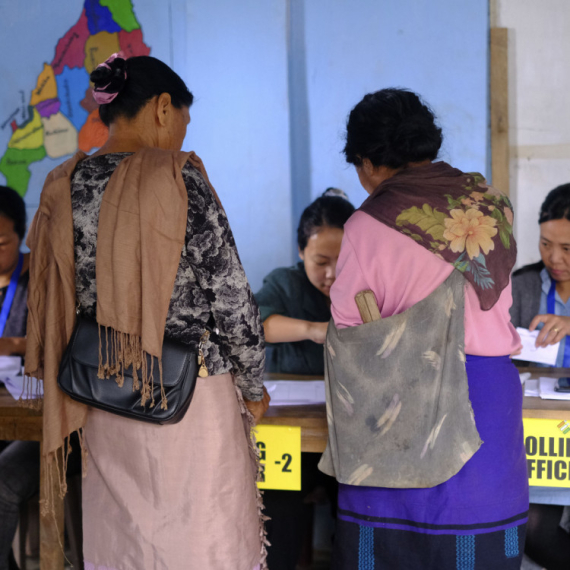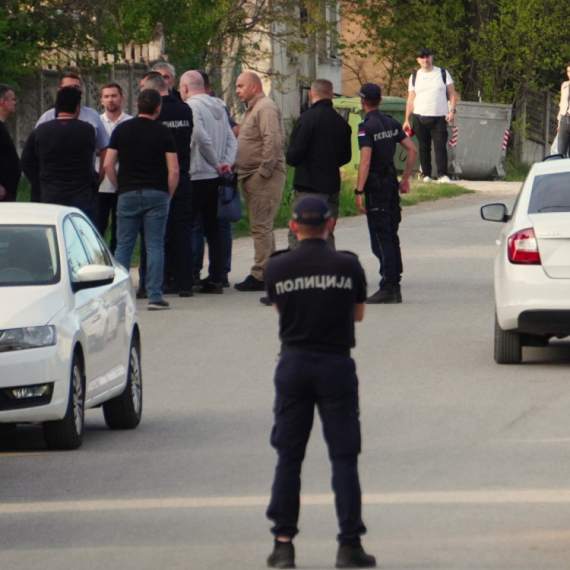Conspiracy and blackmail mentioned as people leave Kosovo
In only two months between 50,000 and 120,000 ethnic Albanians have left Kosovo in a wave migration to western European countries.
Wednesday, 11.02.2015.
11:51

Conspiracy and blackmail mentioned as people leave Kosovo
While Belgrade is merely monitoring the events rather than talking about the reasons behind the exodus, historians based in Kosovo say that in the past, "the reasons for emigration were different," while now Kosovo is being "mercilessly emptied, making the overall situation alarming and with unpredictable consequences."Professor Hakif Bajrami fears that there is "some secret agreement of world powers" behind this mass exodus of Albanians from Kosovo.
Bajrami spoke for the public broadcaster RTK and urged the authorities "to find the strength and stop this exodus."
Demographics professor Rifat Blaku says the migration wave will have "terrible consequences." "This is a tectonic shift for the Albanians in Kosovo," he told the Pristina media.
Meanwhile, "Kosovo's secret service" has been quoted as presenting data to the assembly in Pristina that showed that more than 50,000 Albanians recently left Kosovo.
The local media in Pristina are commenting on "the very strange and unacceptable" behavior of the political leaders, who - except for Ramush Haradinaj, "who recently started to cry at a bus station when he saw the mass of his fellow citizens fleeing Kosovo" - do not attempt halt the trend and "with that give people at least a little hope."
These reports conclude that the politicians' behavior can be explained by their "fear of facing the mass of people leaving Kosovo."
Some media suggest that the number of migrants has reached 100,000 since August but that "officials are hiding this information," while others claim that the number is much higher and exceeds six percent of the total population of the province, which is estimated at just under two million.
Among those leaving are mostly ethnic Albanians, but also Roma, Ashkali, and Egyptians.
Lawmakers from these communities in the Kosovo assembly claim that their countrymen are fleeing because of the very difficult living conditions, and demand from the Kosovo government to urgently take measures to prevent the exodus.
Experts also believe that the mass departure of Albanians is a consequence of many years of unemployment, bad privatizations that did not create jobs, but also "a demonstration against the government's economic policies."
Analyst Fatmir Sheholi, referring to the data of the Mother Teresa Association, said that 18 percent of the population in Kosovo lives in extreme poverty on 0.90 cents per day, while 27 percent have only 1.40 euros a day, and that unemployment is "above 60 percent."
The greatest enemy of Kosovo, says Sheholi, is "corruption, organized crime and clientelistic access to employment in Kosovo's institutions."
Measures
The Kosovo government, meanwhile, announced it was "trying to, with concrete measures," prevent the mass departure of Kosovo residents who have been leaving the territory for several weeks now through central Serbia and Hungary, and recently also via Albania.A spokesman for the Kosovo government, Minister of Labor and Social Care Arban Abrashi, said in an interview published on the Gazetablic.com that the government was "in the process of preparing specific measures." "Write-offs are a beginning, and we will implement other measures, too, if the budget permits them. The consensus is that in the budget overhaul process, the measures to prevent and stop illegal migration should be a priority," Abrashi said.
He explained the budget overhaul was expected to produce fiscal, tax and other incentives to create better conditions for entrepreneurship, and special funds to support most vulnerable groups and open new jobs.
Deputy Kosovo Prime Minister Hashim Thaci said that illegal migration of inhabitants of Kosovo to EU countries was "a worrying phenomenon," and blamed Brussels for delaying its decision on visa liberalization.
Thaci added he was "convinced that the decision will be made by the end of the year."
Blackmail
Meanwhile in Belgrade, ruling SNS party MP and chair of the Parliamentary Committee on Kosovo and Metohija Milovan Drecun said that Pristina's failure to act was encouraging those leaving the province. He also noted that "the mild reaction" from Brussels to the increasing number of immigrants was "surprising."Drecun said that it was the intention of Pristina to politically abuse the discontent of the people who are leaving in search of a better life - in order to make the EU pressure Serbia to "recognize Kosovo as a state and not oppose its membership in the UN."
He added that this was "blackmail of sorts" and one which Pristina has been applying very successfully since the arrival of "the international community."
According to him, "Serbia could now find itself under strong pressure from some EU countries that have recognized Kosovo to accept Kosovo's membership in the UN, under the pretext that, if this is not done, there would be no economic prospects in Kosovo."
Ethnic Albanians in Kosovo seven years ago unilaterally declared independence - a proclamation Serbia rejects as a violation of its Constitution and territorial integrity.
"That's the game behind this unusual sudden wave of migration," Drecun said, adding that "a question for Brussels is - how come the reaction is so mild?"
"We see police cooperation in which Serbia participates, we see that Hungary faces the problem, but Brussels somehow tolerantly lets it slip by," he said.
Tragedies at sea
In Brussels, EU High Representative for Foreign and Security Policy Federica Mogherini on Tuesday announced that she would, in the coming days convene an extraordinary meeting to consider the policy in the area of migrations with EU's commissioner for migrations and internal affairs."I've also decided to put a discussion on migration on the agenda of the Foreign Affairs Council soon," said Mogherini.
Her statement mentioned that the EU "cannot allow other tragedies at sea in the coming weeks and months," and that the organization "needs to be able to give a strong political and operational response."
"The fight against smuggling and trafficking, the rescue of migrants at sea, the protection of asylum seekers are shared challenges; they require a stronger exercise of shared responsibility," said Mogherini.



























































Komentari 25
Pogledaj komentare